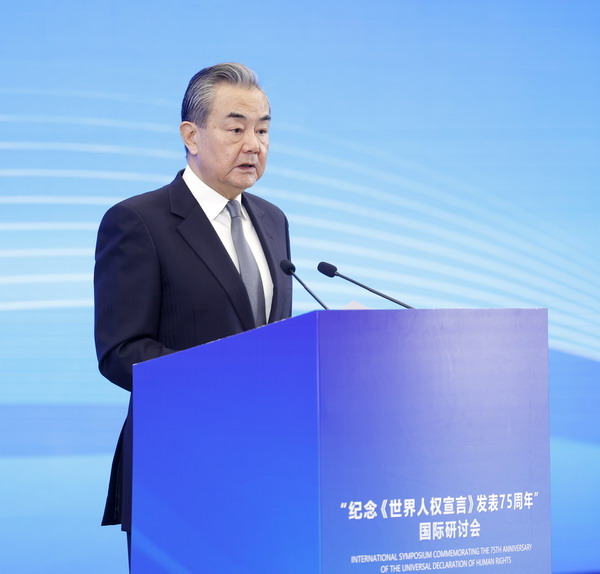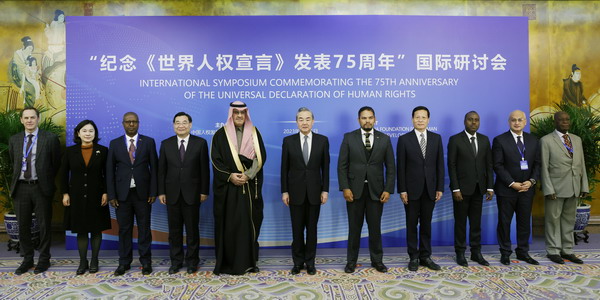| Wang Yi Attends the Opening Ceremony of the International Symposium Commemorating the 75th Anniversary of the Universal Declaration of Human Rights |
| 2023-12-05 17:30 |
|
On December 5, 2023, Member of the Political Bureau of the CPC Central Committee and Foreign Minister Wang Yi attended the opening ceremony of the International Symposium Commemorating the 75th Anniversary of the Universal Declaration of Human Rights in Beijing and delivered a keynote address. Wang Yi said, the Universal Declaration of Human Rights is of great significance for the development of human civilization. It has a profound impact on human rights advancement across the world. Over the past 75 years, the international community has worked relentlessly toward the goal envisaged in the Declaration. The promotion and protection of human rights has taken deep root in people's hearts. The international human rights system has been improved. And countries around the world have taken more effective measures to promote and protect human rights. Wang Yi said, the Communist Party of China (CPC) and the Chinese government have always considered the promotion and protection of human rights to be essential. Applying the principle of universality of human rights to its national realities, China has opened a new path for human rights development that adapts to the changing times and suits its national conditions. Since China entered the new era, the CPC Central Committee with Comrade Xi Jinping at its core has prioritized respecting and protecting human rights as an important aspect of national governance and scored a series of new, historic achievements. China has always taken development as the foundation for human rights and has ensured more effectively the rights to subsistence and development for its people. China has taken a people-centered approach to human rights, and the people's position as masters of the country is fully guaranteed. China has stayed true to its principle that all its people enjoy human rights equally, and the rights of all ethnic groups and special groups are fully guaranteed and more effectively protected. China has participated in global human rights governance, and contributed to worldwide progress in human rights. Wang Yi emphasized that China's path to human rights development best suits its national conditions and reflects its people's wishes. China will remain steadfast on the course. China will continue to conduct exchanges and dialogue with all countries on the basis of equality and mutual respect so as to learn from each other and join hands to make the goal of the Universal Declaration of Human Rights a reality. First, all parties must promote common security and create a secure and tranquil international environment for realizing human rights. All parties must firmly uphold the U.N.-centered international system and the international order based on international law. All parties must act on the Global Security Initiative (GSI), address security challenges with an approach of mutual benefit, seek to resolve differences and disputes through dialogue and consultation, and see that conflicts and wars will be brought to an end and displaced people return to their home at an early date. Second, all parties must prioritize development to provide a more solid material foundation for realizing human rights. All parties must bring greater equity, higher efficiency, and stronger synergy to global development. All parties must build an open world economy, oppose technology blockades, break down technological barriers, and reject development decoupling. All parties must push for an economic globalization that is more open, inclusive, balanced and beneficial to all. All parties must see that people of all countries enjoy equal rights to development.
Third, all parties must engage in exchanges and mutual learning to provide more choices of routes to human rights advancement. Every country and its people should and do have the right to choose their own path to human rights development that best fits their national reality. All parties must respect the diversity of world civilizations. All parties need to act on the Global Civilization Initiative (GCI), increase exchanges and mutual learning, and encourage and respect countries in choosing their own path to human rights development. All parties must see that people of all countries are ensured of human rights fairly through their own modernization drives. Fourth, all parties must uphold equity and justice to provide a more effective platform of cooperation for realizing human rights. All parties must reject any attempt to interfere in other countries' internal affairs or contain their development under the pretext of human rights. All parties must say no to any attempt to politicize or instrumentalize human rights issues or use such issues to draw ideological boundaries. All parties must oppose any attempt to force one's own values and model upon others. The U.N. Human Rights Council and other multilateral human rights bodies must follow the principles of impartiality, objectivity, nonselectivity and nonpoliticization. They must redress the underrepresentation of developing countries, so as to play a truly positive role in promoting international human rights. Wang Yi emphasized that China will continue to promote and protect human rights, participate in global human rights governance, act on the Universal Declaration of Human Rights, and champion humanity's common values of peace, development, fairness, justice, democracy and freedom. China will continue to strive for greater progress in human rights in the world. The symposium was hosted by the China Foundation for Human Rights Development. High-level officials from countries in Asia, Africa, Latin America and Europe, the Office of the U.N. High Commissioner for Human Rights, diplomatic envoys in China, experts and scholars, and representatives of non-governmental organizations, among others, were present, and they held in-depth discussions on the promotion of economic, social and cultural rights, path to human rights development, and global human rights governance, among others.
|


